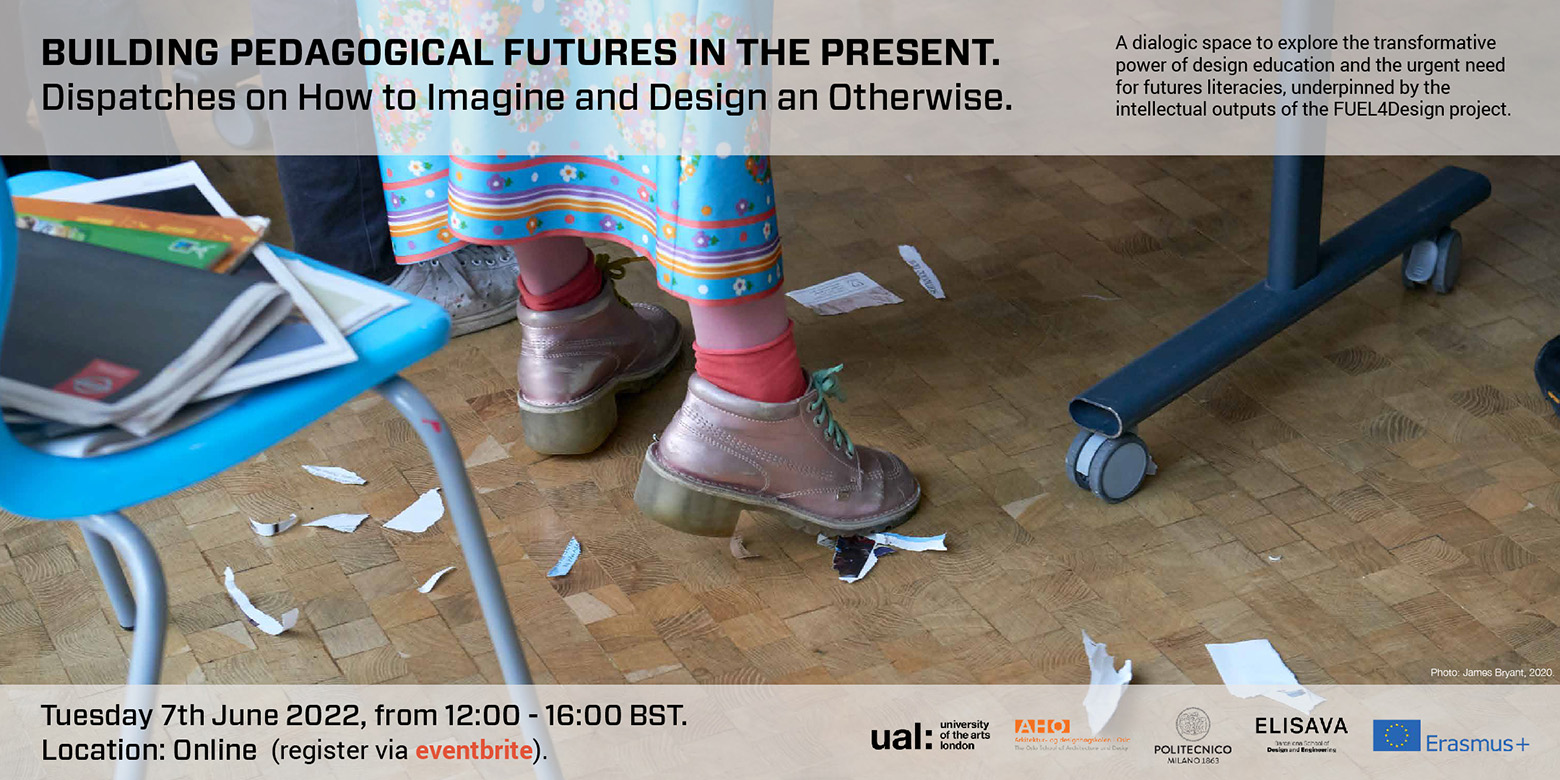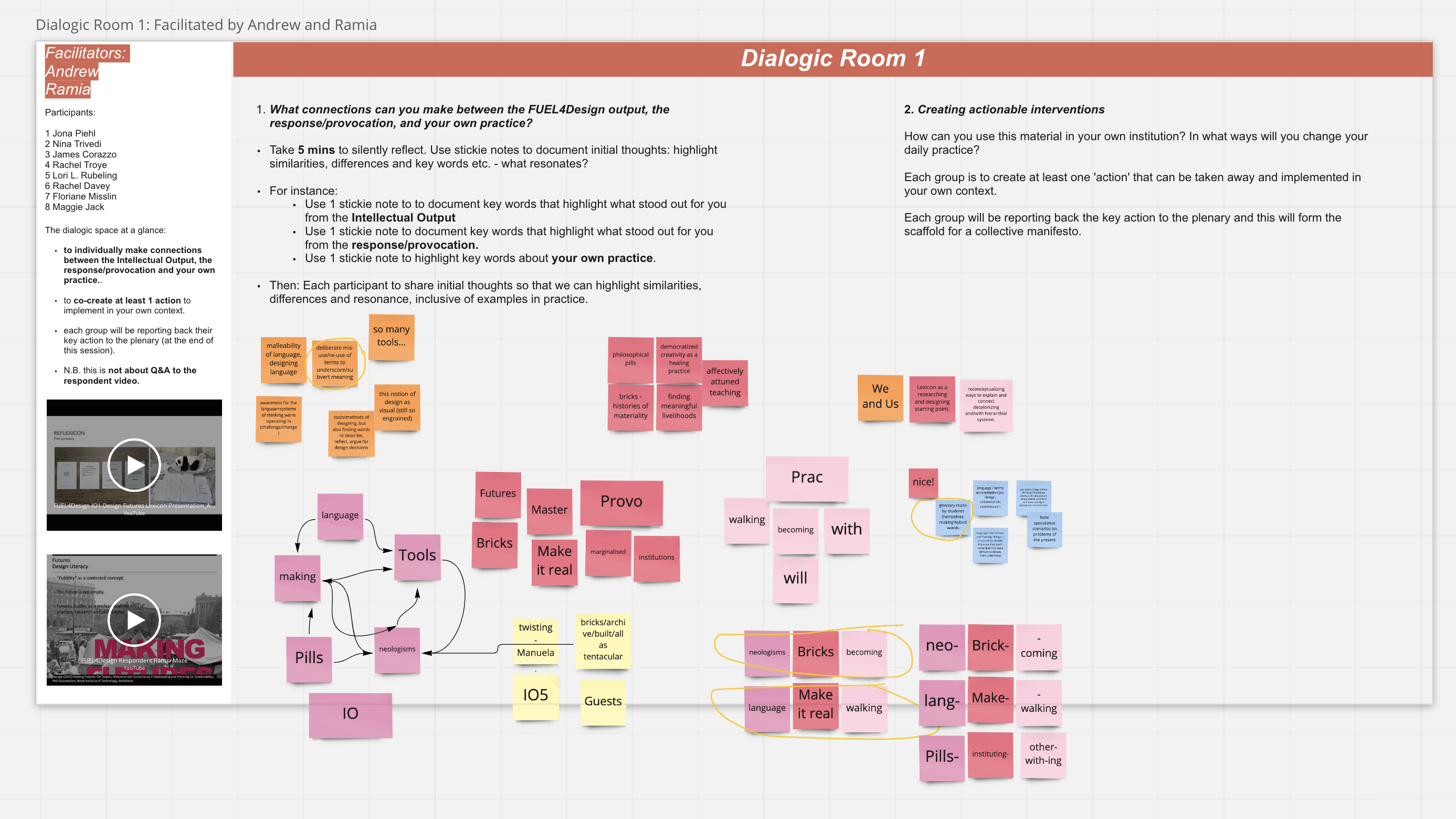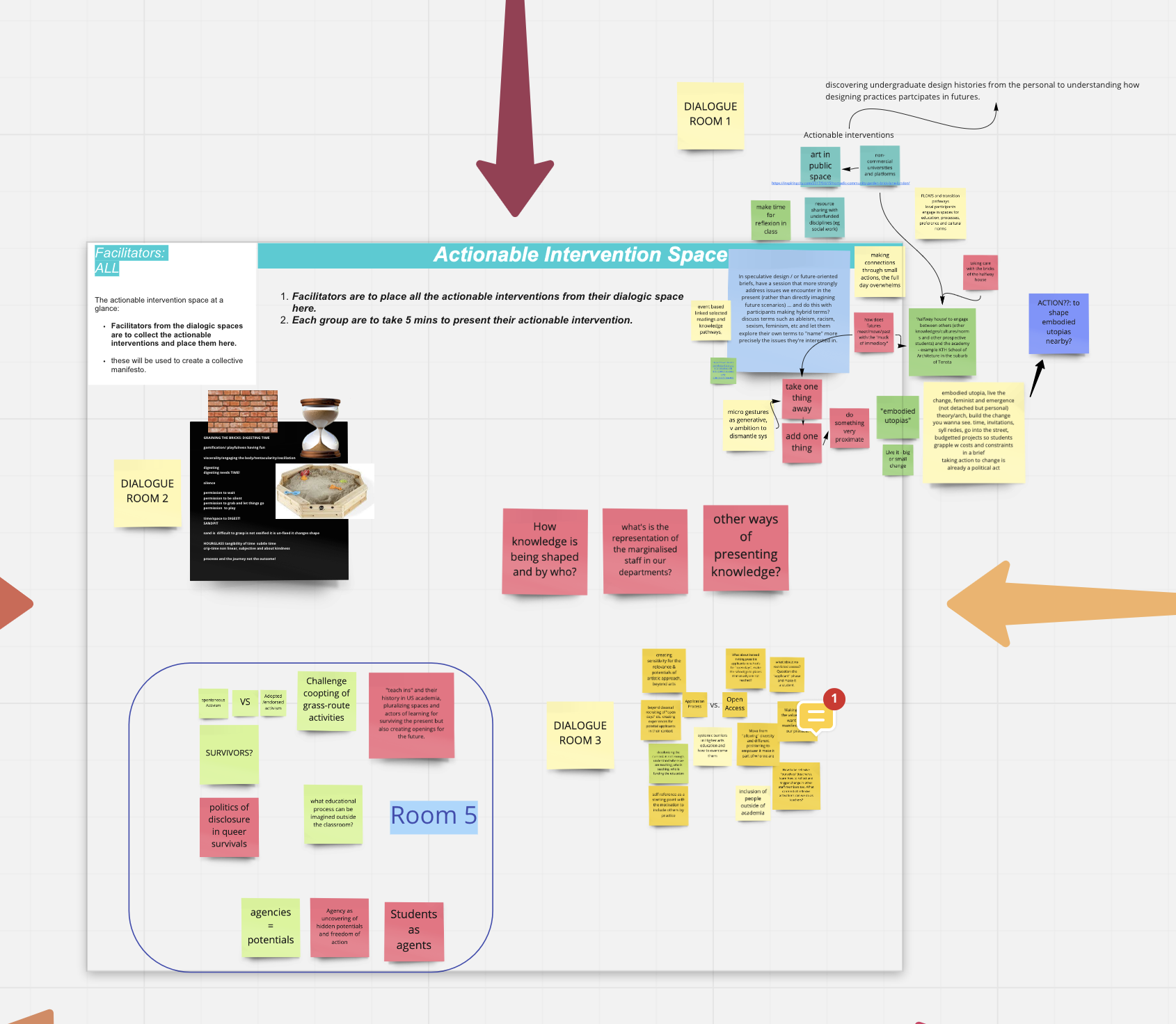
Building Pedagogical Futures in the Present. Dispatches on How to Imagine and Design an Otherwise was a half day online event which took place on the 7th of June 2022 organised by the UAL team, Betti Marenko, Silke Lange, and Pras Gunasekera.
We, the UAL team, wanted to create a dialogic space to explore the transformative power of design education and the urgent need for futures literacies, underpinned by the intellectual outputs of the FUEL4Design project. It focussed on, and expanded from, a showcase of the work produced by the FUEL4Design partners from 2019 to date.
Together, we wanted to imagine an otherwise of design and futures education. Collectively, we wished to foster more just and ethical communities of learners, guided by principles of care, respect, and responsibility.
We brought together a diverse group of educators whose experience and expertise were invaluable in contributing to the dialogic space with a critical perspective.
The event was structured into three phases:
- Phase 1 – Showcase: each of the five intellectual outputs (IO) were showcased to participants through short videos (see below) created by each partner and IO owner.
- Phase 2 – Response: participants were introduced to the videos created by our curated list of speakers who responded to the question: How to imagine an actionable otherwise of futures design literacies within (and beyond) the systemic conditions of our educational institutions? See below for videos.
- Phase 3 – Dialogue: participants were split into preorganised break out rooms led by one of the respondents who facilitated group discussion. The purpose was to develop actionable interventions and to reflect on what can be taken away, with a clear indication of at least one action to apply in participants’ own context.
Phases 1 and 2 were open to the public and created an opportunity for us to widely disseminate the Intellectual Outputs as well the respondents’ videos. Phase 3 was open to registered participants only.
We designed the event with a particular structure in mind; to step out of the usual format of talk and Q&A or panel and instead we chose to have pre-recorded interventions to assemble a live documentation of a moment in time and to enable more time for sharing.
This structure was developed to prioritise what we can do together after listening and feeling inspired, trying to go a little beyond the act of passive receiving of content and instead mobilising one’s own practice in active discussion.
Phase 1: Intellectual Output (IO) videos
IO1 Lexicon – AHO
IO2 Philosophical Pills – UAL
IO3 Scouting – ELISAVA
IO4 Toolkit – POLIMI
IO5 Methods – a course made of units collecting the material we developed POLIMI
Phase 2: Respondents videos
Ramia Mazé. Professor of Design for Social Innovation and Sustainability, London College of Communication, University of the Arts London.
Professor Ramia Mazé begins her response by describing time as a Western, patriarchal, capitalist concept (commodifiable, countable) and suggests that for building different futures, the concept of time as seen in other cultures needs to be considered. For her, future can act as a modality to question our present. What is the role of design in such an approach? How can design be utilised as critical practice in relation to Futures? By posing these questions, Ramia invites us to challenge the status quo, open our minds and include different perspectives to ground and make real our alternative futures. For her, the future is not empty, and future making is a critical practice. These ideas form the politics of the present.
Dr Kush Patel. Faculty Member and Head of Studies (MA in Technology and Change), Srishti Manipal Institute of Art, Design, and Technology, Manipal Academy of Higher Education (MAHE), Bangalore, India.
Dr Kush Patel used the Zine of Archival Meta Data as a vehicle for their provocation: three acts, co-developed with students and facilitators to unpack archival aspects of HEI policies in India with ‘actions’, producing a set of questions to engage working groups and finally collaboratively synthesised reflections and actions in the form of a zine. They explained that the office of Anti-Inequity and Anti-Exclusive Excellence was an attempt to name the politics of survival – namely Queer Survival (inspired by Audre Lorde’s call for naming politics of survival). The zine became a call for collective action to support the development of new knowledges and new ways of seeing the world. Kush left us with some questions to reflect on and inspire action such as ‘What does institutional change with affirmative change look and feel like?’ and ‘Where do I fit into the process of changemaking?’.
Fahim Mohammadi. Professor of Design Foundation and experimental Design in Architecture and Industrial Design, Member of Senate, Stuttgart State Academy of Art and Design Germany.
Professor Fahim Mohammadi focused on the accessibility of Art and Design education, stating it to be a constitutional right, yet this not being the ‘reality’ we know. His provocation centred on a direct question: Are our institutions open and accessible beyond the cultural elites? Drawing on his personal experience, he recalled how, coming from a working-class background, he did not possess the ‘lexicon’ nor the social/cultural capital that is (tacitly) considered foundational in Art and Design HEI’s. He reckons that this is still the case today, with current approaches to ‘opening up’ access for potential students not working i.e., the homogeneity of applicants does not mirror the society. What form of transformation do we need? Is it the conditions of our educational institutions or more broadly the conditions of our society that must change?
Tanveer Ahmed. Senior Lecturer in Fashion/Fashion Communication and Race. Central Saint Martins, University of the Arts London.
Tanveer Ahmed uses the metaphor of bricks throughout her response to provoke thought about the buildings we teach and learn within. A starting point for her own reflection is Audrey Lorde’s ‘The Master’s Tools will never dismantle the Master’s House’ – but who created the Master’s House? Do we know the history of our education institutions? What do the names of the lecture theatres and university buildings tell us about where and what we are operating in? Can we teach radical Art and Design education within the confines of the Master’s House? She thinks not. Her research and approach are to reimagine where we teach, opening different temporalities from the corridor to the canteen and during a lunch hour or after class which have the potential to transform Design education. How can we reimagine the spaces where we teach using a decolonial lens?
Dr Kai Syng Tan Artist, curator, academic and consultant. Senior Lecturer and Programme Leader of the new forthcoming Creative Arts Leadership MA at Manchester.
Dr Kai Syng Tan encourages us to ‘think again’ if we think that we are the solution given the neo liberalisation of Higher Education which has created toxic, (historically) exclusionary spaces that promote ‘dog eat dog’ survival ways of being and doing- ‘like starving dogs fighting for scraps’. How do we engage with the elephant in the design lab, art studio and ivory tower? Kai introduces the concept of ‘tentacular pedagogies’, to enable us to unmake and remake the present, and make humanity more humane. Dismantling the monuments and redesigning the structures and tools that uphold the Master’s narratives and build the Master’s Houses are key to create the spaces that can reposition ‘non-users’ as the true masters and leaders.
Phase 3: Dialogue
As the event was held online, Miro provided a fitting tool to capture the discussions that were emerging in the breakout rooms (see images below).
 Fig 1. Example of a Dialogic online space in Miro.
Fig 1. Example of a Dialogic online space in Miro.
A key aim of the Dialogic Spaces was to explore how we as educators, practitioners, change makers affirm education as a transformative endeavour with a genuine social (which go beyond the human to include the ecological and non-human) purpose? For us to reflect on the future of education in the present means to engage with unequally distributed modes of knowledge-production, asymmetries of communication, in-built hierarchies, visible and invisible. It means to engage with matters of social, racial and environmental justice; it means to engage with and be concerned about its politics – and how the political dimension is found everywhere, in the ‘micro’ – in the gestures, positions, affirmations, intentions, relations, desires and affects that populate our everyday.
The culmination of the discussions within each of the Dialogic Spaces were to create an actionable intervention that could be applied in participants own contexts. The synthesis of these interventions would form the basis of a manifesto for Designing an Otherwise (see image below).
 Fig 2. Actionable Interventions in the online space in Miro.
Fig 2. Actionable Interventions in the online space in Miro.
Conclusion
A key remit of this event was the idea of going beyond a mere showcasing of our work. Instead, what we tried to achieve was a more substantial and explicit way of building connections by sharing reflections and experiences, prompting questions especially uncomfortable ones, and above all, we wanted to make a collective attempt at developing actionable interventions, that participants could ‘take home’ with them, and pilot in their own institution.
The dialogic space on Miro fostered precisely this kind of extended participation. Here below you can find a sample of the interventions emerged during the workshops:
- Give students ‘empty’ time to digest and metabolize content and frame it as an active and essential part of their learning experience.
- Give Permission: to wait, to be silent, to grab and let things go, to play.
- Instigate quiet micro-dismantling actions in the everyday.
- Introduce playful, sand-pit moments that mobilize bodies, walk and talk together.
- Surface experience of personal survival in safe spaces for all learners + teachers.
- Prompting students to share their ‘design’ histories and narratives feeding in co-designed curriculum content.
- Ask students to brainstorm and share ideas and feelings about notions such as ableism, racism, sexism, feminism, etc and let them explore, come up with their own terms, to “name” more precisely the issues they are interested in.
- Making explicit the values that we uphold.
Building Pedagogical Futures in the Present. Dispatches on How to Imagine and Design an Otherwise was an experiment in thinking and practising an otherwise. We are grateful to all the participants and speakers as everybody felt reenergised and invigorated by the event. Not only was its format engaging and powerfully provocative, as one of the attendees put it; it also worked admirably well as a platform for genuine sharing and exchange, beyond our expectations.
“Such moving affinities between each of our provocations today – my heart is full and full of gratitude for bringing us together…especially as we grapple with sites/possibilities for dwelling/building otherwise critiques together” (Kush Patel on Twitter).